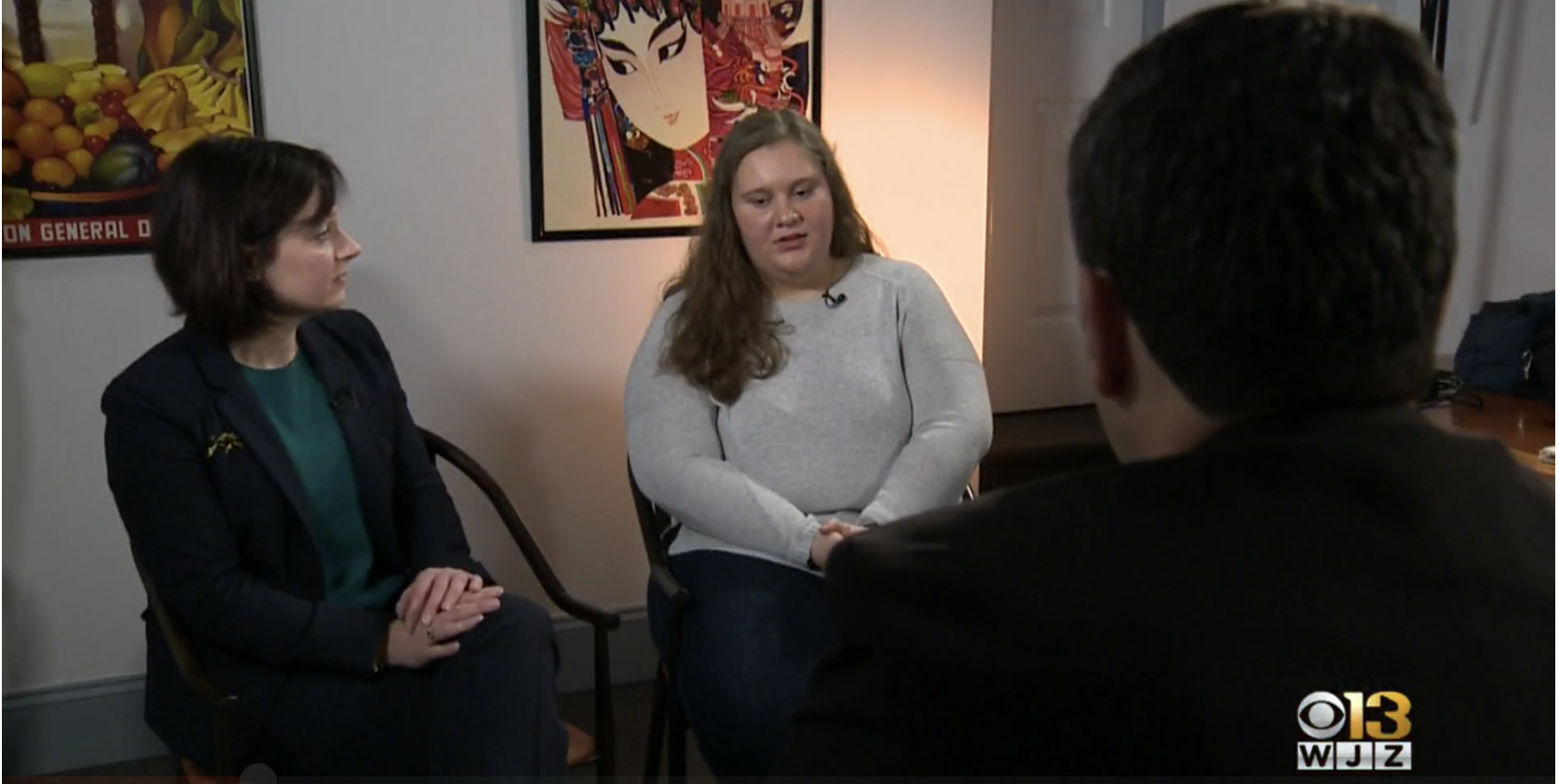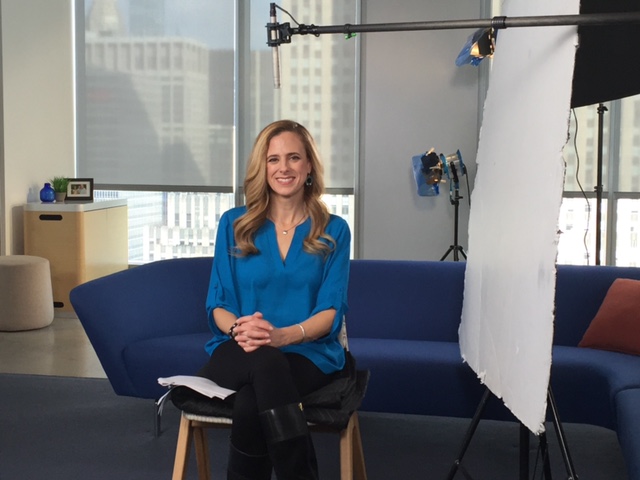Attorney Mary Vargas is dedicated to legally advocating for those with food allergies and food-related disease.
 Like so many who fight for the rights of those with food allergies and food-related disease, Mary C. Vargas found her calling when her youngest son was diagnosed with food allergies and celiac disease. Unlike most of us, Mary also is a founding partner with Stein & Vargas LLP, a civil rights law firm committed to the principle that all people have full and equal access to all parts of American society. Her firm handles both litigation and advocacy on behalf of individuals with disabilities, including those with food allergies, celiac disease and non-celiac gluten sensitivity.
Like so many who fight for the rights of those with food allergies and food-related disease, Mary C. Vargas found her calling when her youngest son was diagnosed with food allergies and celiac disease. Unlike most of us, Mary also is a founding partner with Stein & Vargas LLP, a civil rights law firm committed to the principle that all people have full and equal access to all parts of American society. Her firm handles both litigation and advocacy on behalf of individuals with disabilities, including those with food allergies, celiac disease and non-celiac gluten sensitivity.
You started out working on behalf of those with visual and hearing impairments — how does that mesh with your work for those with food allergies or food-related diseases?
Mary: We represent individuals with disabilities, and federal law dictates what the definition is for being a person with a disability: Somebody who has a substantial impairment of a major life activity. If a person who has a food allergy or celiac or non-celiac gluten sensitivity has substantial impairment when they’re exposed to an allergen or when they ingest gluten, then they are an individual with a disability, and they have a right to full and equal access in almost every realm of the world. In the United States, that includes access to all employment, public services, and government — and, importantly, access to social services and dining. Every, everything that an individual with a disability does, they have a right to full and equal access.
The Americans with Disability Act (ADA) was enacted 30 years ago, and amended in 2008 to specifically add bodily functions to the list of major life activities. Can you explain a little bit about that?
Prior to the changes in the ADA, cases filed by people with medically necessary dietary restrictions were being thrown out of court. This is an issue not just for our community; it was an issue for people with disabilities in general, because courts were saying people with disabilities were not really disabled in ways that were consistent with what Congress intended when the law was originally passed. So the law was amended to make clear to address some of these issues and to say that when a person with a disability says that they’ve experienced discrimination, it shouldn’t be that hard to figure out whether they have a disability or not, that’s not where the focus should be.
The passage of the ADA Amendments Act has allowed us to build a strong foundation that individuals with food allergies, and celiac and non-celiac gluten sensitivity have a right to have a similar experience to that of everybody else.
The ADA didn’t go and put a billboard up in 2008 saying, “Hey, these are now part of the things and you need to pay attention to.” There are a lot of people in the food service industry that don’t even know that food allergies are now covered under the ADA.
Right, and that’s really consistent culturally with how people think about food allergies and celiac disease. We’re always pushing against these cultural misperceptions that if you just don’t eat soy or if you have an Epipen, it’s all good, or that gluten-free is kind of a fad diet. They’re all these cultural misperceptions that pervade the food industry as well as our culture more broadly that we’re pushing up against.
When I draft complaints. I’m not just saying, “Somebody has a food allergy and they could go into anaphylaxis.” I’m making an effort to educate the court and often the other side as well about what exactly it means to live with a food allergy or to live with celiac disease so they understand what is at stake.
There needs to be a mindset change and some education done in our own community to recognize that having a disability is simply a legal definition — it’s, “Do you have a substantial life impairment of a major life activity?” And if you do, then you’re entitled to legal protection. It’s about empowering people to ask to have a seat at the table and to be included. Some of it has to start with our own community.
You are both a lawyer and a mom of someone with a food allergy. How does that play out?
Sometimes you say the same thing. I get calls from parents who have kids with celiac disease who are going on a on a field trip, and they don’t know what to do in order to make it safe for them. I get that on a mom level and a lawyer level.
Two years ago, we got the decision in J.D. versus Colonial Williamsburg Foundation saying that folks who serve food may need to make accommodations for individuals with celiac disease and non-celiac gluten sensitivity. That was on a Friday morning. On Monday morning, my son was going to Hershey park on a class trip, and he was talking to me about whether he could bring his own lunch. As a mom, I wanted to know what to tell him to advocate for himself in a way that’s effective and empowering.
Whether it’s at a meeting or birthday parties or field trips to Williamsburg and Hershey Park, both adults and kids with food allergies don’t want to be a burden. So how can we address that in the workplace?
We now have whole generations of folks with food allergies and celiac disease who are not accustomed to thinking of themselves as individuals with disabilities who have rights. So before we even get to employers or anyone else, we have to make sure that we’re educating our own. There’s a huge resistance sometimes. People with food allergies who don’t want to say they have a disability — “It’s not like I use a wheelchair.” Again, a lot of that comes from cultural misperceptions about what it means to have a disability.
There needs to be a mindset change and some education done in our own community to recognize that having a disability is simply a legal definition — it’s, “Do you have a substantial life impairment of a major life activity?” And if you do, then you’re entitled to legal protection. It’s about empowering people to ask to have a seat at the table and to be included. Some of it has to start with our own community.
Then the challenge is to make sure that folks have the ability, and the obligation, to understand clearly what their legal obligations are toward those with these disabilities. They have to be humble enough to ask a person what they need and trusting enough to recognize that most people don’t go to employers and ask for something that’s unnecessary or something that targets them or makes them different. People want to blend in for the most part.
Everybody has to be educated on what it means to have a right to equal access and then how to make that happen. A few years ago, there was no case law saying that a person who was on a school field trip might need to be allowed to bring their own safe food. This is a big deal, but it just happened in one appellate court so that change has to ripple throughout the United States, and that education will go with that ripple.
It’s really exciting to be at the beginning of something. In the United States, we’re really at the beginning of that of that journey. Cases that weren’t sustainable prior to the change in the law have just gotten to court in the last few years, and we’re just getting to a point where we’re getting decisions, not just in district courts but in appellate courts which take even longer.
And those will those will change things. But there’s a long way to go.
Tell us about the case of the student who filed a discrimination suit against the University of Maryland.
A case like Smith versus University of Maryland is a perfect companion to a case like J.D. versus Colonial Williamsburg. What J.D. needed was the opportunity to bring his own safe food; he wasn’t able to safely eat the food at a venue, so he needed to bring his own in order to be included.

Hannah Smith is a flip side of the same coin. She was a student going off to college for the first time at the flagship university in the state of Maryland. In order for her to be included, she needed to be able to eat safely in the dining hall — and not just to eat tuna fish at every meal, but to be able to eat a balanced diet that was reliably safe for her.
The lesson of both is you need to listen to what the individual needs. I would argue that some entities have to do that, but if for some reason an entity doesn’t have to do that, then they need to find other ways for the person to be included, and that doesn’t mean not eating well when everyone else is.
What the courts have said is in other areas of disability law — in fact, in one of the cases we litigated on behalf of a deaf medical students — is that you have to look at how a program or activity is used by people without disabilities, and then try and give the person with a disability a like experience. Maybe not exactly the same experience, because obviously somebody with a peanut allergy is not going to eat a peanut butter sandwich if everybody else on the trip is doing that, but to look at the experience with an inclusive mindset, and figure out with consultation from the person who knows what they need best how to make their experience something that’s safe and like the experience that other participants have.
I’ve worked events where we were serving 7,000 people, and 683 of them had special dietary requests. That’s challenging for the back of the house. Do you have best practices for the food service industry on what to do on that large a scale?
That’s not really my area of expertise, but I would say that there has to be advanced planning before the conference, before you’re faced with the request for a specific dietary need. Think about what’s offered to everybody and how you can streamline and simplify ways to be inclusive that make it safe and welcoming for your participants, but also lighten the burden.
That may be things like how the kitchen food prep space is set up: Is there a dedicated separate allergy free area? Look at processes for who handles an onsite request for something that you weren’t expecting, who’s the go to person? How are orders handled and documented?
I think as large numbers of people with food allergies are aging into employment, those folks are starting to experience bullying in the workplace, which is terrifying on a lot of levels. You can’t stay in a workplace where somebody is deliberately exposing you to your allergens.
I’m the bad guy who sues people, but I’m not looking to play a game of gotcha. I am looking to identify where there are weaknesses in the system and where we really need to do better. Where you have a young child with a known peanut allergy who’s served a grilled cheese sandwich with peanut butter hidden inside. Those are the situations I’m worried about. I’m worried, someone’s going to die.
Can we talk about food labeling? I find it very frustrating.
There’s a lot of important work that needs to be done to change our labeling laws so that everybody has the information they need.
People who are preparing the food and serving the food need to be appropriately trained to understand the limits on the current labeling laws. When a chef believes that any food they buy from X company would say if it contains gluten, and it doesn’t, that is a dangerous misperception that opens them to liability and makes them more likely to have a situation that’s regrettable, even potentially fatal.
It’s a challenge for folks who are doing this under enormous pressure at events and I have to think that the answer to that is always going to be education.
As the mom of a kid with celiac disease. I can tell you that there is no more grateful customer than the customer who’s had their child have a seat at the table and been included. Those are the customers that will come back over and over and over again. As these kids age into the workplace, event planners and companies that are able to seamlessly provide inclusive experiences for that new reality are going to earn a very loyal following.
Let’s talk a little bit about food bullying.
There was a case, not one of mine, where a worker with a peanut allergy would come into work and find that somebody had crumbled peanut shells all over their desk and their phone, and that person had an anaphylaxis reaction in a meeting — and their boss didn’t call 911.
Unfortunately, this seems to be on the rise. I think as large numbers of people with food allergies are aging into employment, those folks are starting to experience bullying in the workplace, which is terrifying on a lot of levels. You can’t stay in a workplace where somebody is deliberately exposing you to your allergens.
When employers have an attitude of, “it’s not a big deal,” that unfortunately is communicated very clearly to the workers, who then can respond in ways that are really dangerous and certainly unwelcoming. It’s not just employers that they don’t discriminate against anyone on the basis of disability, but at some point, the employer also has to bear responsibility for the environment that they’ve created where people make a mockery of it in a way that’s hurtful, discriminatory, and dangerous.
Employers have to affirmatively act not only to protect that person medically, but to make sure that they’re not targeted in other ways that makes them unequal in the workplace.
LISTEN to the interview with Mary to learn more and hear directly from her about Fighting for What’s Right on the Eating at a Meeting Podcast:



